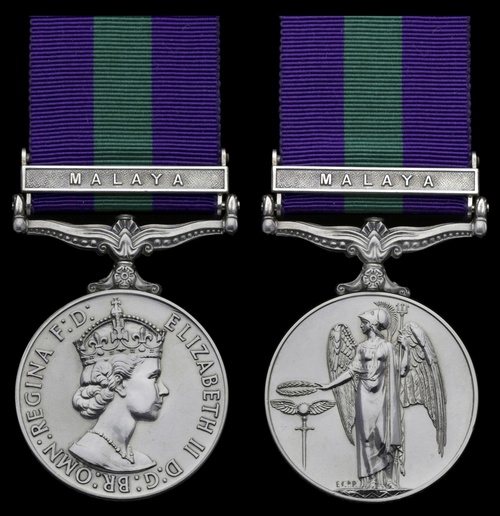
Auction: 20002 - Orders, Decorations, Medals & Space Exploration
Lot: 234
The very rare Suez Crisis casualties General Service Medal awarded to Flying Officer G. R. Urquhart-Pullen, Royal Air Force
Whilst flying as a Canberra Navigator on a flight over Syria, his aircraft was shot down by a member of the Syrian Air Force on 6 November 1956 - despite his two comrades ejecting successfully, Urquhart-Pullen lost his life
General Service 1918-62, 1 clasp, Malaya (Fg. Off. G. R. Urquhart-Pullen. R.A.F.), extremely fine
Geoffrey Roy Urquhart-Pullen was born in 1928 at Ely, Cambridgeshire and was educated at Christ's Hospital and was commissioned Pilot Officer on 17 August 1954. Having served in Malaya, Urquhart-Pullen lifted off from RAF Akrotiri, Cyprus on the afternoon of 6 November 1956 for a photo reconnaissance sortie in WH799 of No. 58 Squadron set over Syria. The flight had three members of crew, Flight Lieutenant B. L. Hunter in command, with Urquhart-Pullen as Navigator and Flight Lieutenant A. C. Small as a second Pilot to observe the events. Having been tasked to secure photographs of supposed Soviet combat aircraft in Syria. As it were, they were soon intercepted by Syrian Air Force Pilots al-Garudry and al-Assasa, in Gloster Meteor NF13. The overall interception had been planned in collaboration with Squadron Leader Tahir Zaki of the Egyptian Air Force. Hunter takes up the story:
'At about the same time (that he decided to climb back into cloud cover), Sam Small warned of a pair of Meteors coming from port of starboard. I can't remember which. I had to turn into their attack. So there were three factors in this particular problem, none of which was helpful to the others as no matter where the Meteors were coming from, I had to turn towards them. It went on like this for a few minutes, which seemed like several hours, and during the first attack we did not get hit. Then Sam said almost immediately after the first attack, with us still climbing, that another pair were coming in, so we turned again. I turned towards them and that's when the starboard engine was hit.
I had been calling Roy, who was in the prone position to take photographs, to come back to the rumble seat (a spare seat alongside the pilot). He got the message, I think, but did not come back. Eventually, it got to the stage where I was rapidly losing control of the situation, one engine out, still burning. I told Sam to get out, to eject, and from the rear navigation position he ejected quite safely. We were still under attack and I started the desperate business of trying to get hold of Roy. I never did contact Roy on the R/T and, as far as I know, he must have gone back to the rear navigation position to try and eject. Since the ejection seat had gone, I assume he tried to bale out. I am not sure, but I think I heard a big thud on the aircraft which could have been Roy's body hitting the tail plane. I suspect it was. I then ejected. It seemed only seconds before I hit the ground and broke my left ankle. The sequence of events was very quick so I couldn't possibly estimate how low I was, but I remember thinking at the time, if I don't get out now I won't get out. I didn't know whether I got out over the Lebanon or not, my mind was revolving around the fact that if I'm in Syria they're not going to be very friendly.'
The aircraft crashed just inside Syria but the crew managed to descend into the Lebanon which probably saved their lives, but it was too late for Urquhart-Pullen. His body was found with the wreckage and was buried in the Anglo-American Cemetery, Beirut. His young widow, with whom he had only been married to for 22 months also had to deal with the political fallout of his loss. Given the sensitivity of what had occured, Whitehall officials saw that the loss of the aircraft was given a different spin. The Air Ministry attempted to cover tracks proposing that:
'If the two aircrew make no damaging admissions we should say that this was an unarmed aircraft on a training flight over the Mediterranean, which, on coming out of the cloud, discovered that it had lost its way and was, in fact, over Syria. It was immediately attacked by Syrian fighters and made at once for the nearest safe haven, which happened in this case to be the Lebanon. It is unlikely that anyone would believe such a story but it would at least deny the Lebanese any pretext for interning the two surviving members of the crew.'
Either way, the news was broken to his widow by the Squadron Leader in Cyprus. Urquhart-Pullen was quietly given his burial and Hunter, despite his wounds, attended. His widow was thankfully allowed to pen and inscription for his gravestone:
'Mean Speak and Do Well. Proudly remembering his example of love and loyalty.'
Subject to 20% VAT on Buyer’s Premium. For more information please view Terms and Conditions for Buyers.
Sold for
£1,200
Starting price
£400




